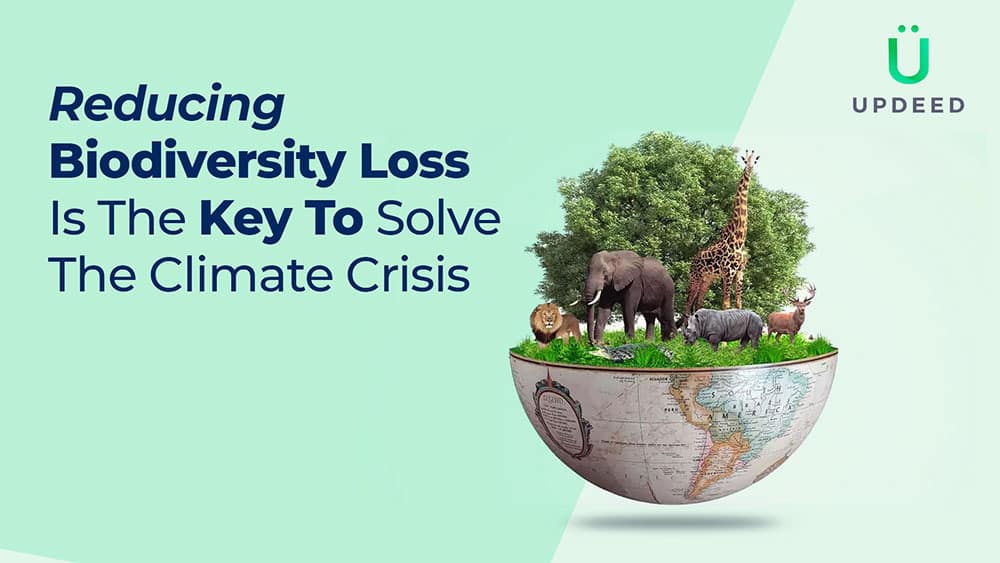Reducing Biodiversity Loss Is The Key To Solve The Climate Crisis
In the face of escalating climate change concerns, the world has come to recognize the critical importance of reducing greenhouse gas emissions, transitioning to clean energy sources, and implementing various mitigation strategies.
Yet, a vital piece of the climate puzzle often overlooked is the intricate relationship between biodiversity and the climate crisis. In this article, we delve into why addressing biodiversity loss might hold the key to solving the climate crisis, supported by solid and credible data.
At first glance, climate change and biodiversity loss may seem like distinct environmental issues. However, they are profoundly intertwined, and understanding this relationship is paramount to crafting effective solutions.

Consider this: Healthy ecosystems with diverse plant and animal species act as natural carbon sinks, capturing and storing carbon dioxide (CO2) from the atmosphere. Research by the Intergovernmental Science-Policy Platform on Biodiversity and Ecosystem Services (IPBES) reveals that intact forests, for instance, can store 40 times more carbon per unit area than degraded ones.
Similarly, oceanic ecosystems, teeming with biodiversity, play a crucial role in absorbing CO2 and regulating global climate patterns.
The data speaks volumes
Concrete data further highlights the nexus between biodiversity and climate. Recent studies show:
Carbon Sequestration: Forests alone store approximately 80% of terrestrial carbon and absorb around 30% of global CO2 emissions annually. Loss of biodiversity within these ecosystems diminishes their capacity to sequester carbon effectively.
Ecosystem Services: Biodiverse ecosystems provide essential services like pollination, soil fertility, and water purification, which are integral for agriculture and climate resilience. A decline in biodiversity jeopardizes these services.
Climate Resilience: Biodiverse ecosystems are more resilient to climate change impacts. For example, coral reefs with a rich diversity of species are better equipped to withstand rising sea temperatures and acidity levels.
Economic Implications: The value of global biodiversity-related economic activities, including agriculture, fisheries, and forestry, is estimated at around $125 trillion per year, or more than double the world’s GDP.
Mitigating biodiversity loss
To combat biodiversity loss and its detrimental effects on climate, concerted efforts are imperative. Key strategies include:
- Conservation: Protecting and restoring natural habitats, like forests and wetlands, can enhance carbon sequestration and preserve biodiversity.
- Sustainable land use: Implementing sustainable agriculture and forestry practices that prioritize biodiversity can maintain ecosystem health while mitigating emissions.
- Policy action: Governments worldwide must integrate biodiversity and climate considerations into policies, emphasizing the importance of both for long-term sustainability.
- Public awareness: Raising awareness about the interconnectedness of biodiversity and climate change is crucial. This awareness can encourage individuals and businesses to support conservation efforts and make environmentally conscious choices.
- International cooperation: Collaboration on a global scale is essential to address these challenges comprehensively. Initiatives like the Paris Agreement and the Convention on Biological Diversity promote collective action.
In the grand scheme of climate action, we must view biodiversity conservation not as a standalone endeavor but as an integral part of a holistic strategy to combat the climate crisis.
By recognizing the undeniable link between biodiversity and climate change and taking decisive action to preserve our planet’s rich tapestry of life, we move closer to a sustainable and resilient future.
As we navigate the challenges posed by climate change, let us remember that protecting the diverse ecosystems of our world isn’t just an ecological duty—it’s a climate imperative. Through these intertwined efforts, we have a real chance to mitigate the climate crisis and ensure a thriving planet for generations to come.
Ready to make a positive impact in the world?
UPDEED is the place for you. Our free and open platform is filled with inspiring stories from individuals and organizations who are making a difference in their communities and beyond. Connect and collaborate with like-minded individuals from around the globe on UPDEED, and discover your own potential to create meaningful change. Join our community and make a difference.





